Reports and Resources
Consult our resource library to find and download our latest reports and publications.
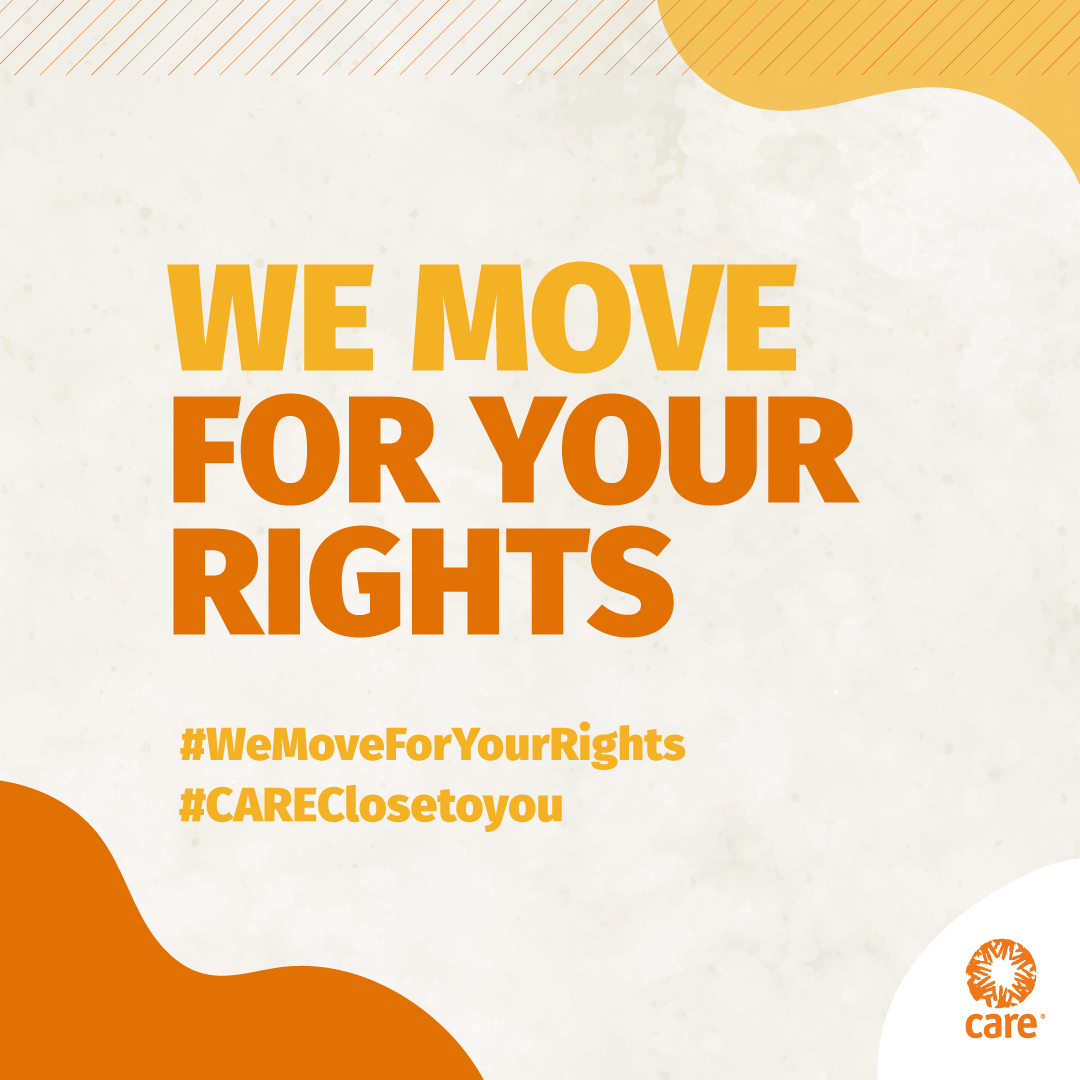
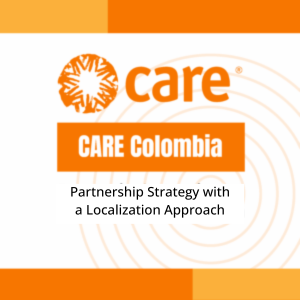




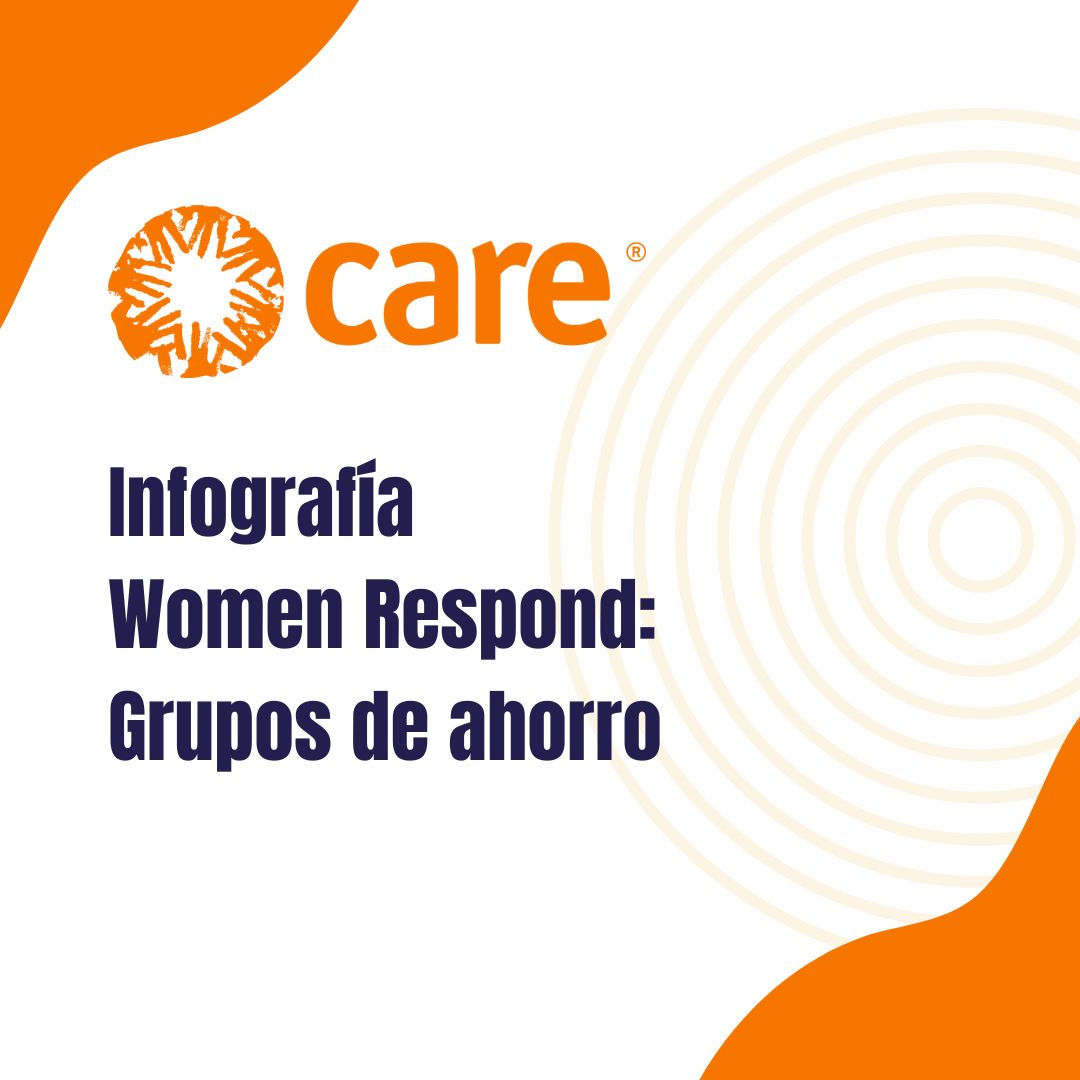




Newsletter Catatumbo Adelante 2025
The Catatumbo Adelante 2025 bulletin. This bulletin aims to highlight the impact of the humanitarian crisis in the region of Catatumbo, Norte de Santander, as well as the differential effects on girls, women and people with disabilities; at risk of increased gender-based violence and disability, increased vulnerability and limited access to rights, due to the crisis. The document draws on the consortium's own The document is based on the consortium's own sources of information, as well as on information from official institutions of the Colombian State and multilateral and cooperation agencies.

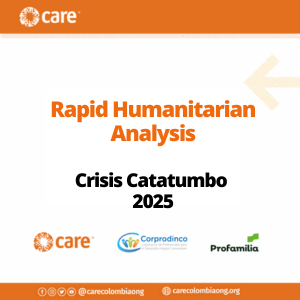
The main objective of this Rapid Humanitarian Analysis (RHA) is to identify the barriers to access to services and main needs - especially affecting women, girls and boys - due to the humanitarian crisis that has been unfolding since January 2025, due to the confrontation between Non-State Armed Groups - NSAGs - in the area of Catatumbo in Norte de Santander. Catatumbo in Norte de Santander.
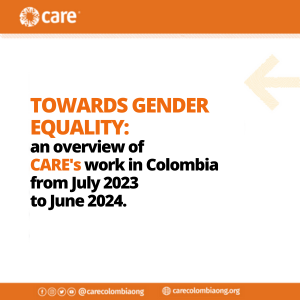
Learn about the scope of CARE's work in CARE's work in Colombia during the months from July 2023 to June 2024, the achievements, strategies and alliances that strengthen the work in the territory in the four impact areas: Resilient Communities and Leaders in Emergencies Program, Sustainable Communities and Adapted to Climate Change, Empowered Communities that Achieve Economic Justice, and Peace-building and Violence-Free Communities. that achieve economic justice, and Communities that build peace and are free from violence.
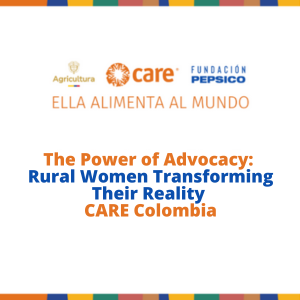
The Advocacy Agenda is a tool to promote the empowerment of rural women in Nariño. Based on the recognition of their invaluable contribution to regional and national development, this agenda is committed to building a more just and egalitarian society where rural women, guardians of the land, food producers and transmitters of culture, occupy the central place that corresponds to them.

The report identifies the most representative results of the study in five dimensions: demographic identification, regularization process, economic and labor integration, access barriers, and interests and motivations. These dimensions consistently correspond with the analysis matrix designed for the purpose of guiding the analysis towards more specific categories and would account for the connection between these variables and the specific objectives of the study.

This document seeks to make visible the needs and challenges for the care and access to sexual and reproductive rights. and access to sexual and reproductive rights in the municipality of Ipiales in the context of the migration crisis. in the municipality of Ipiales in the context of the migratory crisis and in the municipalities of Samaniego, Policarpa and El Rosario affected by the armed conflict.

This bulletin aims to highlight the unmet needs in Sexual and Reproductive Health, as well as gaps in addressing reproductive violence in the context of armed conflict in the municipalities of Buenos Aires, Morales, and Suárez in Cauca, where the Tejiendo Caminos Consortium funded by ECHO is active.

Newsletter for the Tejiendo Caminos 2024 project

This publication contains key information on the impact of the Tejiendo Caminos project, implemented by CARE Colombia and Humanity & Inclusion and funded by ECHO, in the departments of Cauca, Nariño and Norte de Santander. los departamentos de Cauca, Nariño y Norte de Santander.

This bulletin aims to highlight the barriers and unmet needs for exercising and enjoying sexual and reproductive health in the context of migration in Norte de Santander, in the Southwestern Region of Cúcuta, and in the Catatumbo subregion as border areas, connected with the armed conflict, creating scenarios of multiple impacts in the department, where the ECHO-funded “Tejiendo Caminos” Consortium operates.

The objective of this bulletin is to make visible the access barriers in the care and protection routes for Gender-Based Violence (GBV) that are present in the department of Nariño, within the framework of the Tejiendo Caminos consortium.
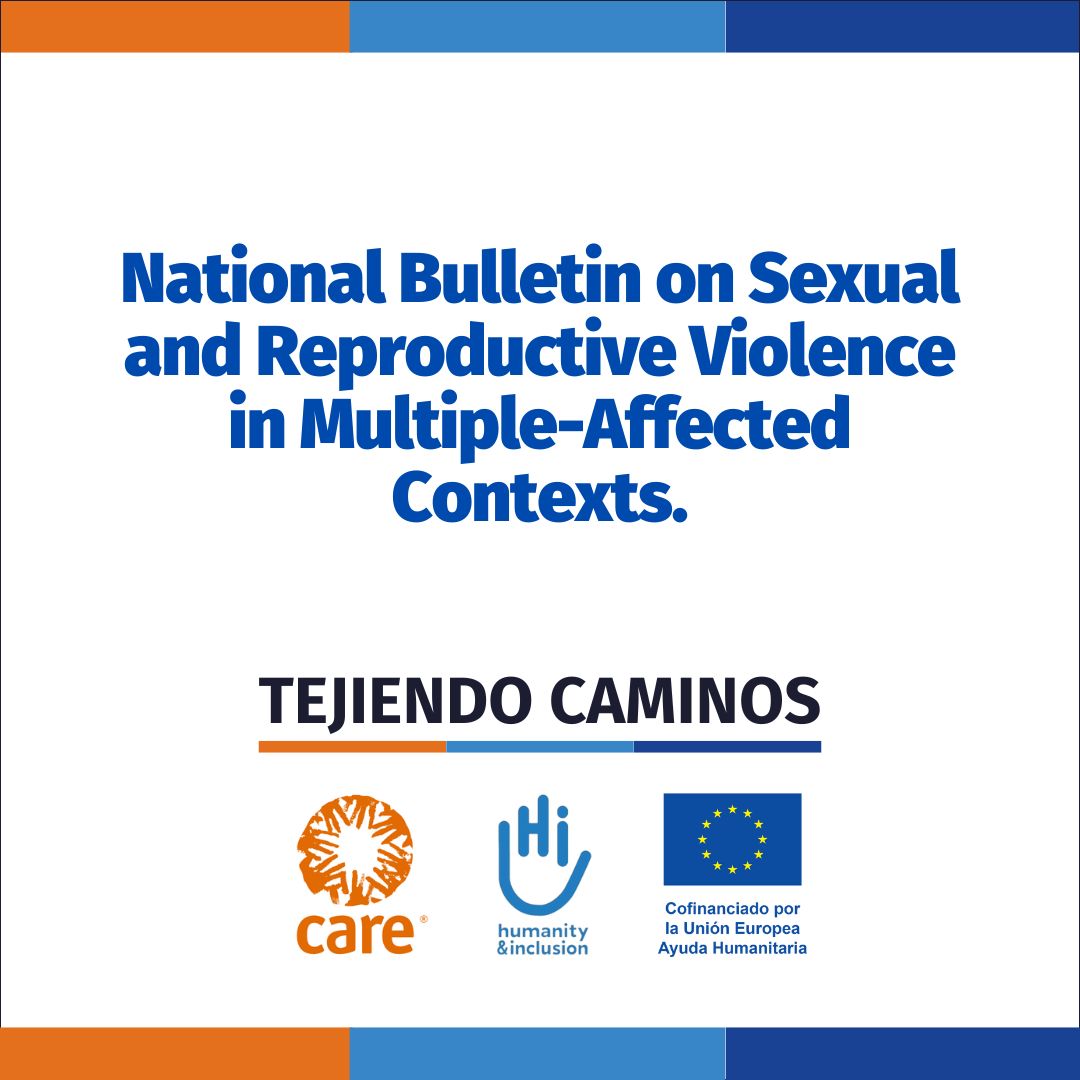
Overview of Sexual and Reproductive Health Services in the context of Armed Conflict and Migration in Colombia. This document highlights the challenges in accessing sexual and reproductive rights (SRHR) in regions affected by armed conflict and migration, such as Cauca, Norte de Santander, and Nariño


Addressing the Rise of Syphilis and Congenital Syphilis:
The increase in syphilis, particularly congenital syphilis, poses a public health threat in Colombia. However, there is a curative treatment in the form of penicillin (one to three doses), which is low-cost; the challenges are early detection, diagnosis, and timely treatment in a context of high vulnerability and mobility. This document summarizes the results of three studies we completed, along with a pilot health services project implemented by CARE Colombia, within the COL-VAC-SIF project (through Charité and managed by the German Institute for Global and Area Studies) and funded by the Deutsche Gesellschaft für Internationale Zusammenarbeit (GIZ) in Norte de Santander, from March to August 2023.

Protection Risks for Migrant Women in Transit between Norte de Santander, Santander, and Nariño
The analysis was built from qualitative and quantitative data collected during support and accompaniment processes for 7,647 migrants by CARE Colombia and OXFAM Colombia/Fundación Mujer y Futuro (FMF) as part of the humanitarian response. These processes took place along the protection route in the departments of Norte de Santander, Santander, and Nariño, between June 1, 2022, and April 30, 2023.

CARE Colombia Programmatic Strategy 2023 - 2027
This strategy has been developed through a participatory process that included the CARE technical team and its partners, under the leadership of the CARE Colombia management team, and received valuable contributions from the regional team, CARE USA, and other CARE members with whom this Country Office regularly works. This document is organized from a context analysis that addresses the current reality of the political, economic, and social problems the country is facing and explains the added value that CARE Colombia has to contribute to building a more just and equitable society. Subsequently, the strategic framework on which this strategy is based is identified, then moving on to define the CARE Colombia theory of change and the programs and strategies to be promoted over the next five years.

The aim of the RGA is to analyze the differentiated and disproportionate impacts in relation to gender as a consequence of the migration crisis and the Colombian armed conflict in Norte de Santander and Nariño from 2018 to 2023. For this purpose, information from 6 municipalities was systematized: Cúcuta and Pamplona in Norte de Santander, and Samaniego, El Rosario, Policarpa, and Ipiales in Nariño.

This document explores, among other things, the main gaps in access to Sexual and Reproductive Health, key public health events, and more.
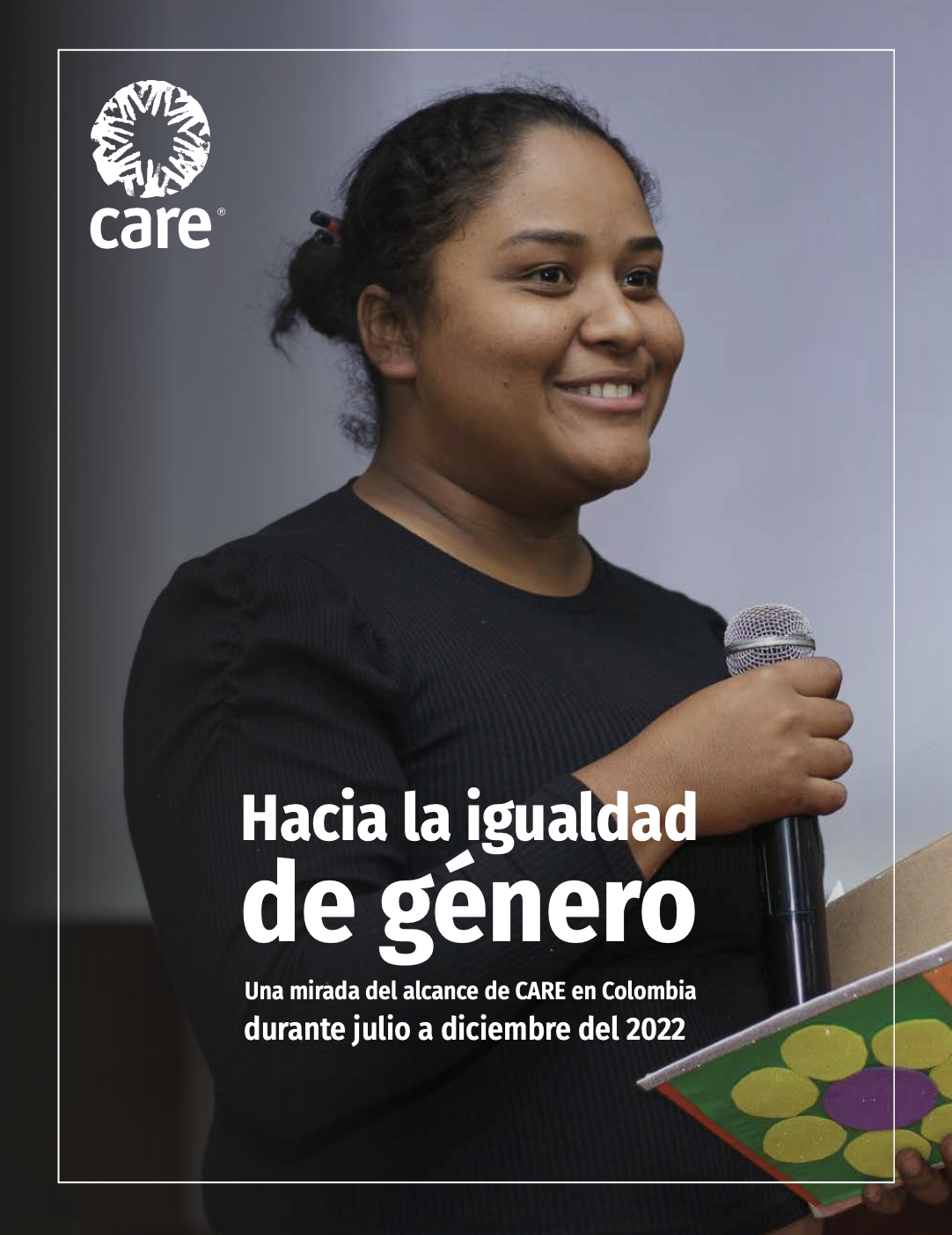
Towards the Gender Equality
A look at the scope of CARE in Colombia from July to December 2022
These achievements are highlighted through the participants reached in the programmatic lines of Sexual and Reproductive Health (SRH), Protection, with a special emphasis on Gender-Based Violence (GBV), Child Protection, and economic empowerment, promoting social integration through regularization and the implementation of strategies such as Women Leaders in Emergency (WLiE), economic inclusion with Community Savings Groups (VSLA), as well as activities associated with securing strategic alliances and advocacy on key national issues.

Rapid Gender Analysis 2023
Necoclí
This document corresponds to the collection, analysis, and systematization of information using CARE's Rapid Gender Analysis toolbox in Necoclí, Antioquia.
This document identifies the gender impacts generated by the humanitarian crisis as a result of mixed migration flows on the Colombian-Panamanian border, based on the triangulation of primary and secondary information collected through different instruments in the prioritized municipality.

Rapid Gender Analysis 2023
Norte de Santander y Nariño
This Rapid Gender Analysis (RGA) highlights the progress in access to rights for people who have successfully obtained temporary protection status, the results show significant progress in access to health and education rights.
There is a need to strengthen actions aimed at creating formal income sources for the refugee and migrant population, as regularizing their migration status has not brought formal employment opportunities. This is further exacerbated for women due to their caregiving roles. Additionally, there are challenges in the participation and recognition of migrant and refugee women and the LGBTIQ+ community in community and civic participation settings.
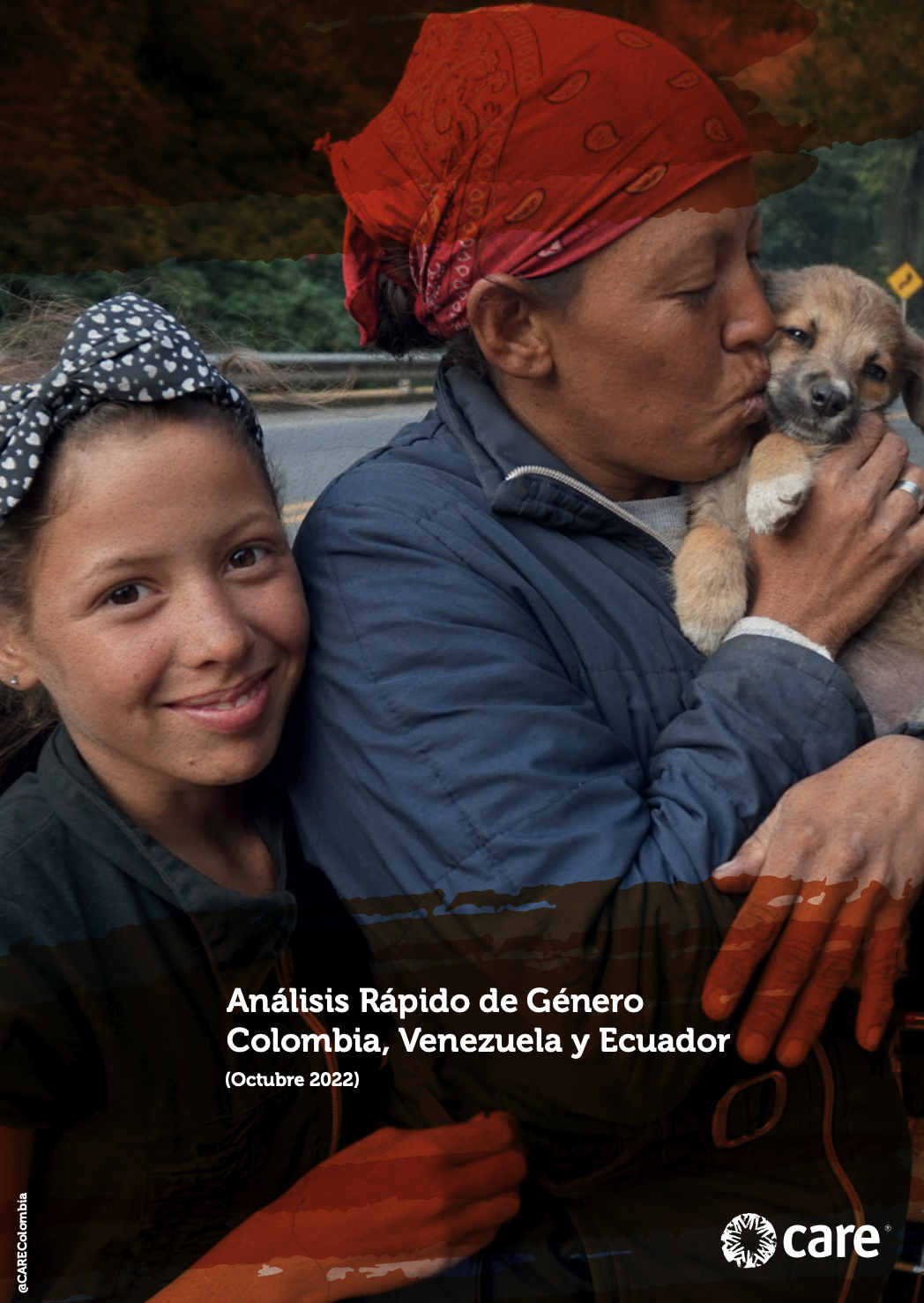
Rapid Gender Analysis 2022
Colombia, Venezuela, and Ecuador
By August 2022, the total number of Venezuelan refugees and migrants worldwide was 6,805,209. Of this population, 5,745,664 are distributed in Latin America and the Caribbean. Specifically, 2,477,558 are in Colombia and 502,214 in Ecuador. These figures contain underreporting, as they mainly reflect official records of regular movements, with certain exceptions, according to R4bu if both regular and irregular entries are considered, the number of Venezuelan refugees and migrants in the region is estimated to be over 6.81 million.
Los resultados del ARG revelan que al no existir registros específicos de la población LGBTIQ+ en las estadísticas poblacionales nacionales siguen siendo una comunidad invisibilizada y subrrepresentada en casos específicos como los contextos migratorios.
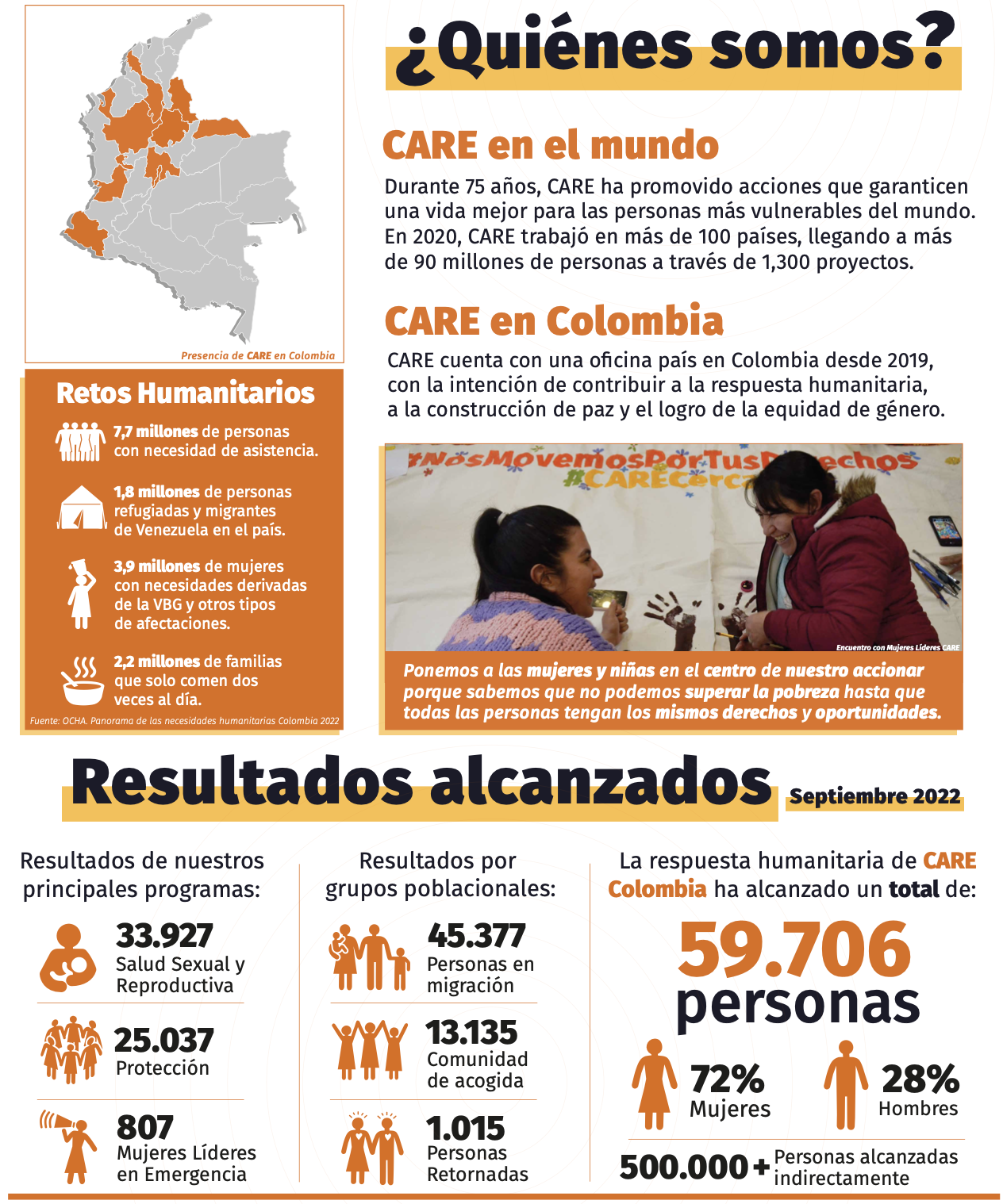
PAGER - CARE Colombia - September 2022
Find information about the CARE Colombia office, humanitarian challenges, achieved results, programmatic strategy, our approaches, and defined impact areas.
This strategy outlines the organization's main commitments to overcoming poverty, contributing to peace, achieving gender equity, and responding to various humanitarian crises in these countries.
All actions align with CARE's 2030 Strategy to save lives, promote sustainable change, and multiply impact.
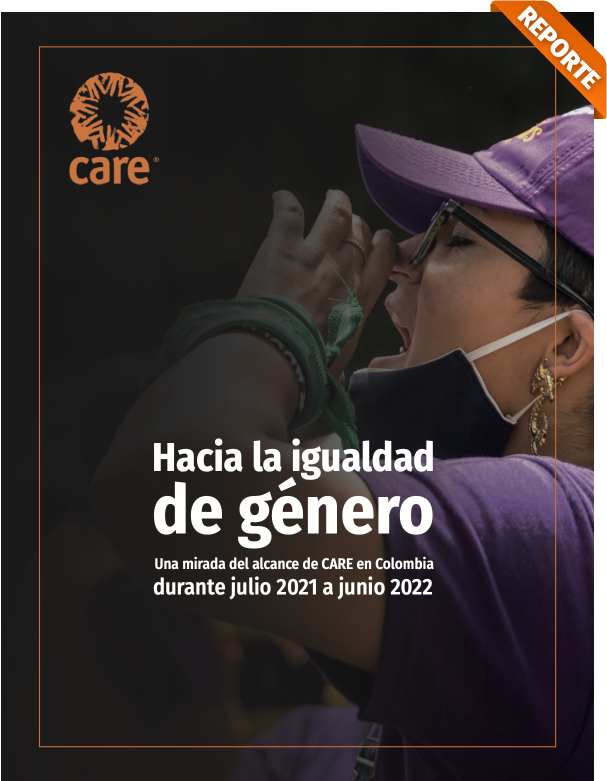
Towards the Gender Equality
A Look at CARE's Reach in Colombia from July 2021 to June 2022
This document provides an account of the reach achieved by CARE and its partners during the fiscal year 2022, corresponding to the period from July 1, 2021, to June 30, 2022, in Colombia, with a central focus on mainstreaming the gender approach.
Estos logros se visibilizan a partir de las y los participantes alcanzados en las líneas programáticas de Salud Sexual y Reproductiva, Protección, con especial énfasis en Violencias Basadas en Género y Recuperación Temprana. Lo anterior a partir de la promoción de la integración social a través de la regularización, y por medio de las estrategias de Mujeres Líderes en Emergencia (WLiE), y la integración económica con los Grupos de Ahorro Comunitario (VSLA), así como las actividades asociadas a la consecución de las alianzas estrategias y aquellas que buscan la incidencia en temas claves a nivel nacional.

Cross-border Rapid Gender Analysis (RGA)
By July 2021, the total number of Venezuelan refugees and migrants worldwide was 5.6 million, with 1.7 million in Colombia and about 432,900 in Ecuador. The Rapid Gender Analysis (RGA) contained in this document presents the gender impacts of the COVID-19 health emergency in the context of the migration crisis for people in human mobility from Venezuela (migrants and those needing international protection) in the Andean zone that is part of the border between Colombia and Ecuador, particularly in the populations of Ipiales and Pasto (Colombia) and Ibarra and Tulcán (Ecuador).
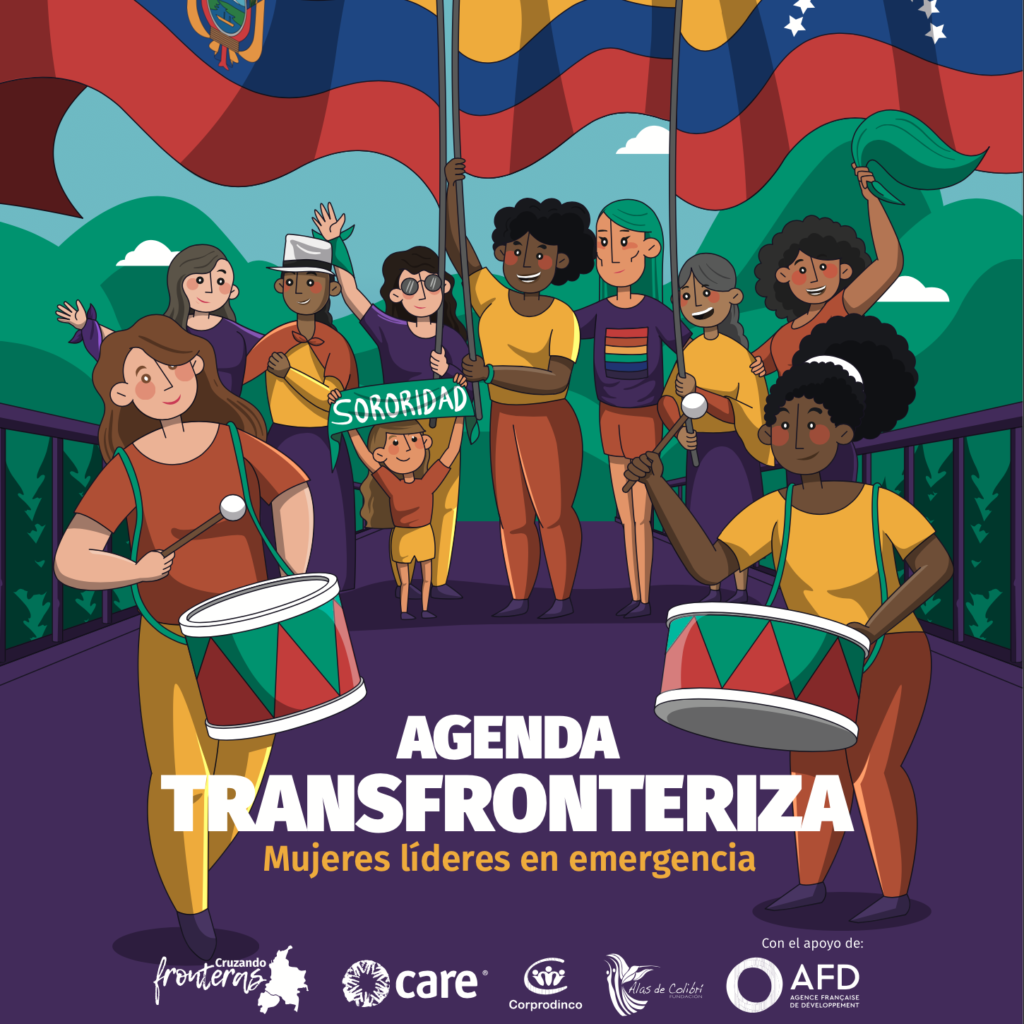
Cross-Border Agenda - Women Lead in Emergency
The "Crossing Borders" project, implemented by CARE-Ecuador and CARE-Colombia, aims to "Strengthen and coordinate cross-border actions for the protection and assistance of the population impacted by the Venezuelan migration crisis, especially women and girls." It promotes the creation of a Cross-Border Comprehensive Management Model that addresses, protects, and provides humanitarian assistance to the population in mobility. The project seeks prevention and protection in cases of gender-based violence (GBV), human trafficking (HT), and facilitates access to sexual and reproductive health services.

Strengthening Safe Spaces
Safe Spaces are places that aim to provide people with a space where they can find responses to dignify their lives, reclaim rights, and make universal human rights effective.
The process of strengthening safe spaces is an action that should be understood as a process, involving different phases, as well as the validation of protocols, appropriation of spaces (materials, adequacy, and protocols) by the staff, and learning processes.
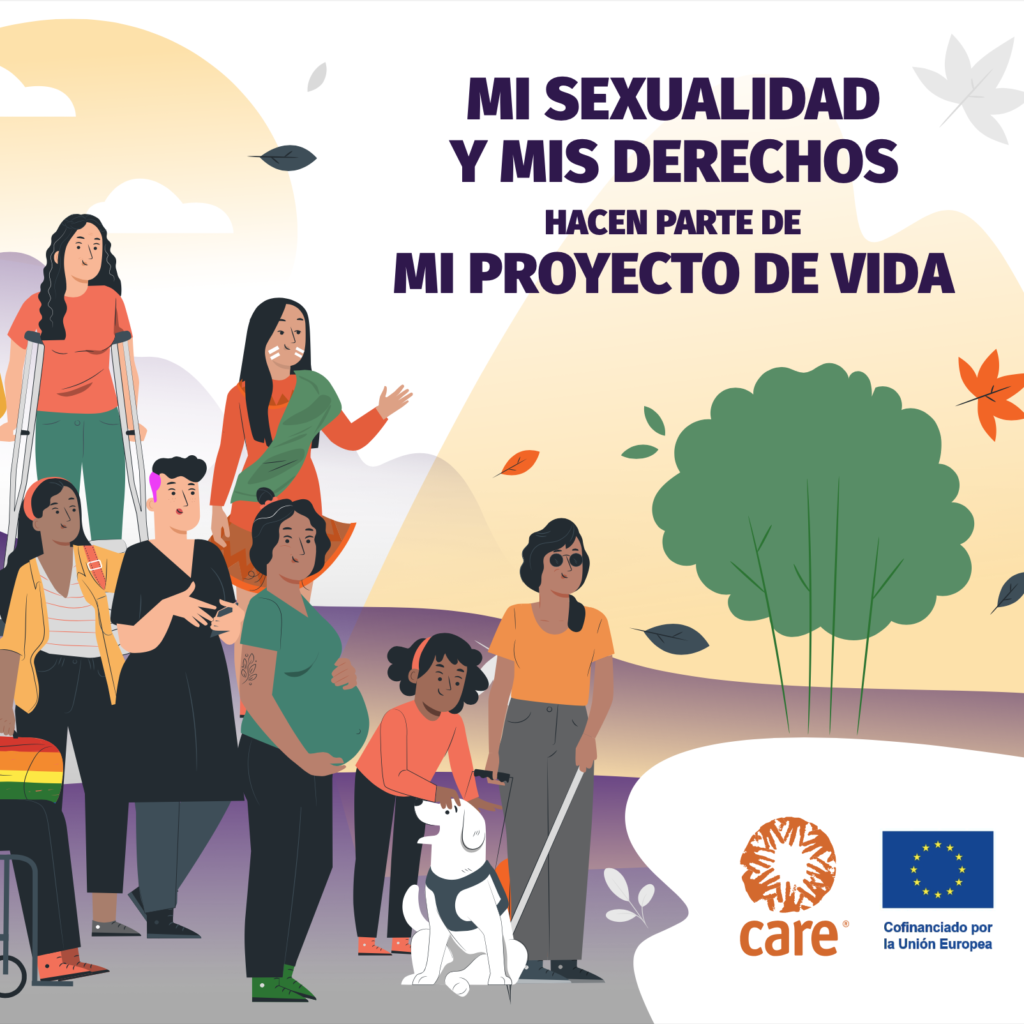
My Sexuality and My Rights
It is a social and cultural construct based on the roles and behaviors expressed from each person's gender identity.
Gender is independent of the sex assigned at birth and sexual orientation. It is the individual experience of gender as each person experiences it, which may or may not correspond to the sex assigned at birth. How we perceive ourselves as people, how we live, and how we express our being.

Cash Transfers in Humanitarian Settings
Displaced women and girls are particularly vulnerable to various risks, including GBV, before, during, and after humanitarian crises. However, the environments where displaced people live often receive insufficient funding and inadequate support, especially for GBV survivors. It is proposed that specialists leading response actions for assisting GBV survivors include cash transfer programs when appropriate.
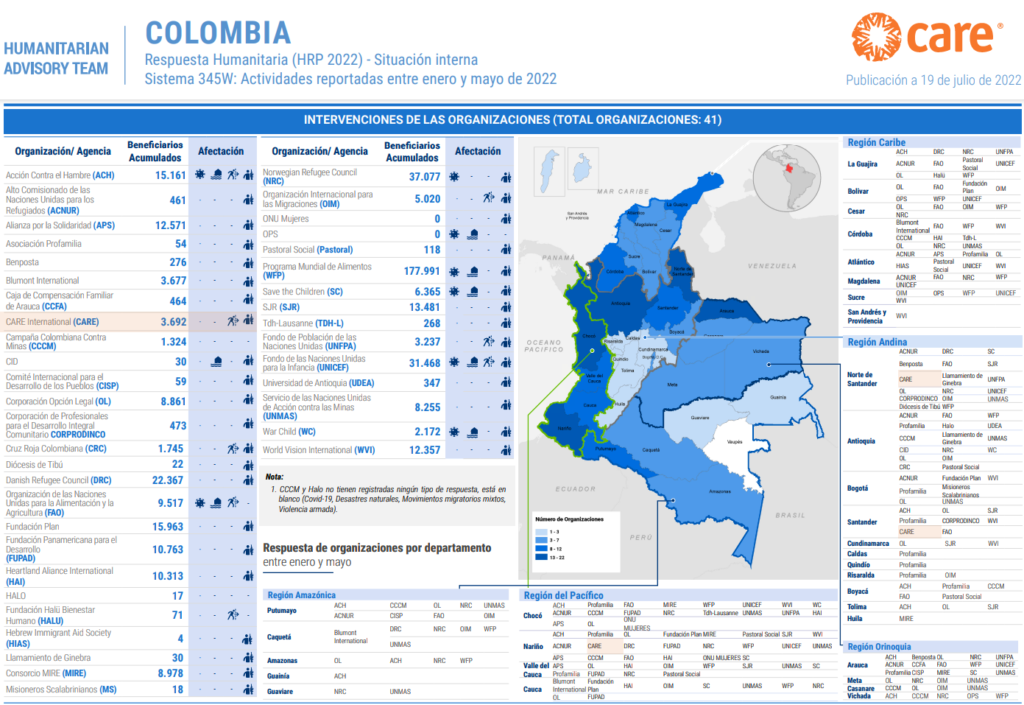
Humanitarian Response (HRP 2022) - Internal Situation
In this infographic report, you can see CARE Colombia's humanitarian activity and response throughout the national territory, as well as other NGOs and governmental organizations present in Colombia.
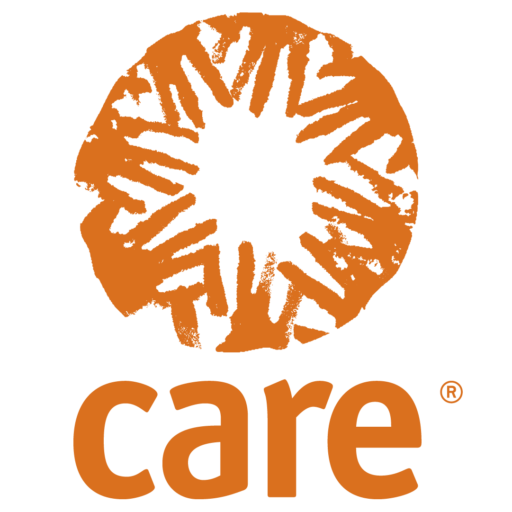
CARE works worldwide to save lives, defeat poverty, and achieve social justice. We seek a world of hope, inclusion, and social justice, where poverty has been overcome and all people live with dignity and security.
90% of all our expenses go towards program services and supporting our poverty-fighting projects worldwide.